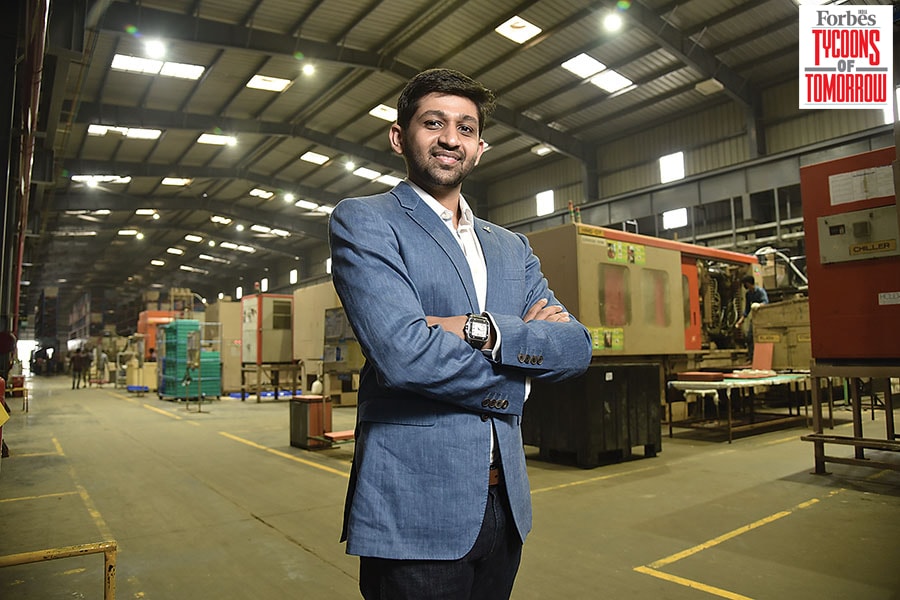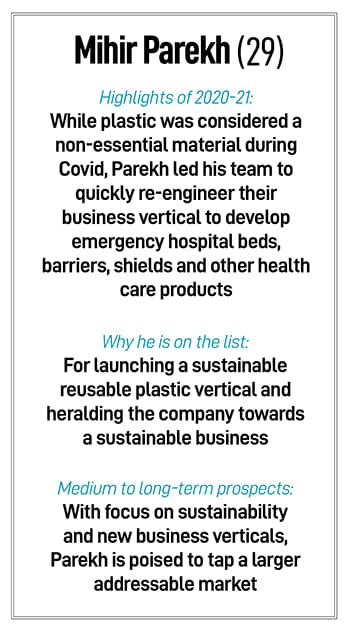Nilkamal's Mihir Parekh: Eyes on a sustainable future
The fourth generation of plastics behemoth is striving to make the company future-ready by building sustainable, long-lasting products


 Mihir Parekh, Executive director, Nilkamal
Mihir Parekh, Executive director, Nilkamal
Image: Hemant Mishra for Forbes India
Imagine your teacher in school repeating how plastic is a non-renewable resource and not good for the environment, and you are sitting in class all self-conscious because you come from a family that’s ubiquitous with plastic products for four decades.
Meet Mihir Parekh, executive director at Nilkamal, the first member of the fourth generation to join the legacy business. “From back then itself, I started spending time to understand why is plastic bad," says Parekh. And the answer he came up with: Because it is being used and disposed incorrectly. The problem for Parekh to solve, thus, was—can he build something sustainable and reusable?
With this question at the core, Parekh founded a division, BubbleGuard, now the third important vertical of the listed firm Nilkamal (the other two being furniture and material handling). “One of the values I’ve consistently held has been on the sustainability front. It is something I’m passionate about. BubbleGuard was launched with the aim of being a sustainable packaging solution," says Parekh, 29, who studied mechanical and manufacturing engineering from University of Warwick and completed his master’s from London Business School.
After graduating in 2013, Parekh returned to India, but he didn’t want to join the family business immediately. He wanted to work at a firm that would give him diversified exposure. He ended up joining homegrown investment banking firm Avendus Capital where he worked in the consumer deals team, managing transactions ranging from warehousing and logistics, to food and beverages to microfinance. “Working in the consumer deals team gave me wide exposure to different business models. It was two years of intense and rigorous but enjoyable work," says Parekh. When joined the family business, the company was at crossroads, with the family trying to determine how it wanted to make Nilkamal future-ready.
 “We have a mature business, so the idea was to look at new business opportunities going forward. My first role at Nilkamal was business development, specifically to identify new areas of diversification," adds Parekh.
“We have a mature business, so the idea was to look at new business opportunities going forward. My first role at Nilkamal was business development, specifically to identify new areas of diversification," adds Parekh.
After working on his first project for a little under a year, he identified that packaging is an area that blends well with the ethos of the company, specifically with plastic as the base of the product. “But the idea was to bring in something that doesn’t exist in India." Parekh started the vertical in early-2017, but it took nearly a year to set up the greenfield project.
What really is BubbleGuard? A material or type of sheets made with a patented European technology that makes honeycomb structured plastic sheets, explains Parekh.
These sheets are fabricated into boxes, packaging materials, specifically for returnable and reusable packaging. Most plastics are single-use packaging material, but BubbleGuard is a business-to-business packaging made for reusability. And these sheets are completely recyclable, helping companies reduce their carbon footprint.
In 2020, Parekh was elevated as executive director and, over time, his responsibilities expanded to business strategy. But 2020 was also when Covid-19 hit, and India underwent one of the strictest lockdowns in the world, putting pressure on companies considered “non-essential", a category that plastics belonged to.
According to the company’s annual report, it proved to be a challenging year for BubbleGuard with muted sales in the first half. Key dealers and distributors were closed and orders for packaging were delayed or suspended as demand fell. However, during the second half, 40 percent sales growth helped in achieving a growth of 6 percent over the financial year.
After rounds of brainstorming, his team came up with a waterproof and lightweight hospital bed made from BubbleGuard, which could be installed in three minutes. The company donated 2,000 beds to a Covid facility in Delhi. The bed was just the beginning the team then started making Covid-related products people would need, like plastic barriers for public transport and others under various brands like VirusGuard, TravelGuard etc.
For the quarter ending September 2021, Nilkamal reported revenues of ₹689 crore as compared to ₹492 crore during the same period last year it reported a net profit of ₹27.4 crore as compared to ₹49.87 crore during the same period last year.
In the aftermath of Covid, the group realised that people are buying more through ecommerce. Currently Parekh is leading some strategic initiatives to make the company more digital-friendly.

He has also led the family’s personal investments in startups, most of them into tech-driven furnishing and home-related companies. “The idea is to use these investments to build a stronger capability and get a footprint into the tech-driven furniture space," Parekh says.
“Mihir joined the Avendus analyst programme as a young, eager lad and his sincerity, dedication and strong business acumen made him stand out. He thinks on his feet and knows when to pivot a strategy," says Abha Agarwal, who co-heads the consumer, finance and business services vertical for Avendus’s investment banking business. “At Nilkamal, it’s this same intuition that has enabled him to shift gears from packaging to support India’s health care infrastructure in the midst of a pandemic. He has grown to become an astute entrepreneur, expanding new growth avenues for the company."
First Published: Dec 29, 2021, 11:33
Subscribe Now